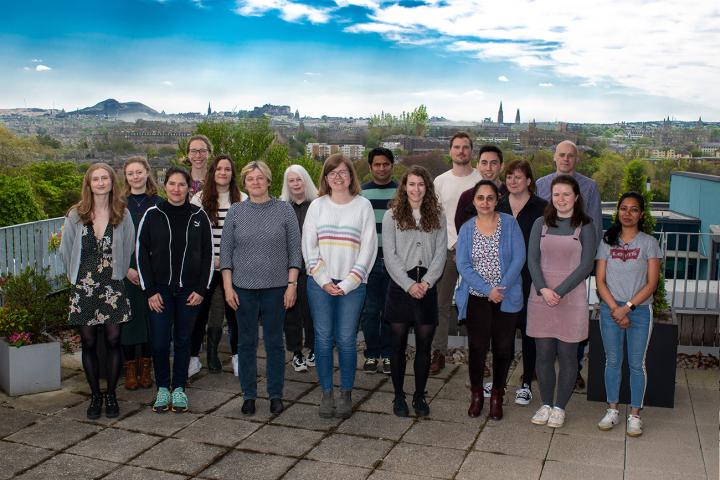Wendy Bickmore Research Group
Spatial Organisation of the Human Genome

Director: MRC Human Genetics Unit
Research in a Nutshell
Despite its immense length, the linear sequence map of the human genome is an incomplete description of our genetic information. This is because genome function and regulation is also impacted by the way that DNA sequence is folded up with proteins within chromosomes and within the nucleus. Our work tries to understand the three-dimensional folding of the genome, and how this controls how our genome functions in normal development and how this may be perturbed in disease.
We take a multidisciplinary approach, using cytological, genetic, genomic and biochemical methods, as well as animal models, to understand genome spatial organisation and how it contributes to gene regulation. A prominent feature of our work is the use of visual assays to investigate how the genome is folded up.
We examine the spatial organisation of human and mouse chromosomes and genes in the nucleus and how this organisation is changed, for example, during development and in certain genetic diseases. We use microscopy to follow the folding path of specific gene loci as they are activated or switched off, and to identify the proteins that bring about this folding. We also use the tools of synthetic biology to artificially control the expression or silencing of genes, to test our hypotheses.

People |
|
| Group Leader | |
| Dr Shipra Bhatia |
Investigator scientist |
| Shelagh Boyle | Research Assistant |
| Anita Mann | Research Associate |
| Dr Simon Biddie | Clinical Lecturer |
| Dr Elias Friman | Research Fellow |
| Dr Luciana Gomez Acuna | Postdoctoral scientist |
|
Dr Iain Williamson |
Investigator Scientist |
| Dr Yatendra Kumar | Postdoctoral scientist |
| Grace Alston | PhD student |
| Beth Bartlett | PhD student |
| Karin Purshouse | Clinical Fellow |
| Giovanna Weykopf | PhD student |
| Alexis Ioannou | Precision Medicine PhD student |
Contact
Publications
- DNA Methylation Directs Polycomb-Dependent 3D Genome Re-organization in Naive Pluripotency McLaughlin, K., Flyamer, I. M., Thomson, J. P., Mjoseng, H. K., Shukla, R., Williamson, I., Grimes, G. R., Illingworth, R. S., Adams, I. R., Pennings, S., Meehan, R. R. & Bickmore, W. A., 12 Nov 2019, In: Cell Reports. 29, 7, p. 1974-1985.e6 18 p. Research output: Contribution to journal › Article › peer-review
- Developmentally regulated Shh expression is robust to TAD perturbations Williamson, I., Kane, L., Devenney, P. S., Flyamer, I. M., Anderson, E., Kilanowski, F., Hill, R. E., Bickmore, W. A. & Lettice, L., 30 Sep 2019, (E-pub ahead of print) In: Development. 146, 13 p., dev179523. Research output: Contribution to journal › Article › peer-review
- Decreased enhancer-promoter proximity accompanying enhancer activation Benabdallah, N. S., Williamson, I., Illingworth, R. S., Kane, L., Boyle, S., Sengupta, D., Grimes, G. R., Therizols, P. & Bickmore, W. A., 7 Nov 2019, In: Molecular Cell. 76, 3, p. 473-484.e7 19 p. Research output: Contribution to journal › Article › peer-review
- Nuclear pore density controls heterochromatin reorganization during senescence Boumendil, C., Hari, P., Olsen, K. C. F., Acosta, J. C. & Bickmore, W. A., 1 Feb 2019, In: Genes & Development. 33, 3-4, p. 144-149 Research output: Contribution to journal › Article › peer-review
- Histone H3 globular domain acetylation identifies a new class of enhancers Pradeepa, M. M., Grimes, G. R., Kumar, Y., Olley, G., Taylor, G. C. A., Schneider, R. & Bickmore, W. A., Jun 2016, In: Nature Genetics. 48, 6, p. 681–686 6 p. Research output: Contribution to journal › Article › peer-review
Full publication list can be found on Research Explorer: Wendy Bickmore — University of Edinburgh Research Explorer
Collaborations
- Dr Juan-Carlos Acosta, Institute of Biomedicine and Biotechnology of Cantabria, CSIC, Spain
- Prof Jef Boeke, NYU Langholm health, USA
- Professor Josh Brickman, University of Copenhagen, Denmark
Partners and Funders
- MRC
- Wellcome Trust
- BBSRC
Scientific Themes
Chromatin structure, gene regulations, enhancers, epigenetics, nuclear organisation.
Technology Expertise
Advanced subcellular imaging, genome and epigenome editing, chromosome conformation capture, chromatin immunoprecipitation.


